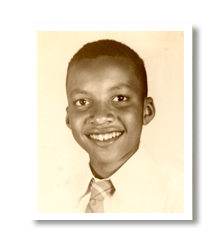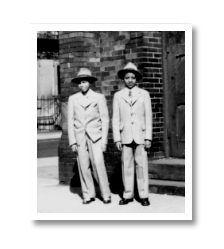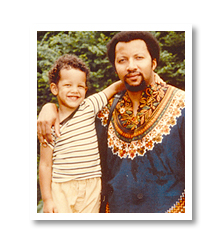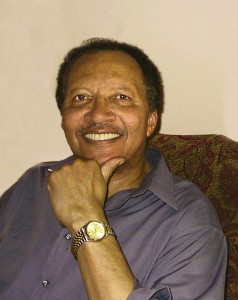
“I was born on a Thursday, the 12th of August, 1937, in Martinsburg, West Virginia. My name at birth was Walter Milton Myers. I was about two years old when my mother died and then I was inexplicably given to Florence and Herbert Dean. I was raised in Harlem by Herbert, who was African-American and Florence, who was German and Native American and wonderful. They loved me very much and I grew to love Harlem.

As a child, my life revolved around my neighborhood and church. The neighborhood protected me and the church guided me. I resisted as much as I could. I was smart (all kids are smart) but didn’t do that well in school. I had a speech impediment and often found myself leading with my fists when teased.
I found solace in books. My mother read to me from a very young age. From my comfortable perch on her lap, I would watch as she moved her finger slowly across the page and I’d imagine the characters. Reading pushed me to discover worlds beyond my landscape, especially during dark times when my uncle was murdered and my family became dysfunctional with alcohol and grief.
I wrote well in high school and an English teacher (bless her!) recognized this and advised me to keep on writing no matter what happened to me. “It’s what you do,” she said. I ended up dropping out of high school (although now Stuyvesant High claims me as a graduate) and joined the army on my 17th birthday.

After the army, I was struggling through life—holding on just enough to survive. Remembering my high school teacher’s words, I began writing at night. I wrote short columns for a local tabloid and stories for men’s magazines.
A turning point for me was the discovery of a short story by James Baldwin about the black urban experience. It gave me permission to write about my own experiences. Somehow I always go back to the most turbulent periods of my own life. I write books for the troubled boy I once was, and for the boy who lives within me still. It’s what I do.”
— Walter Dean Myers
 Walter Dean Myers won the Council on Interracial Books for Children contest in 1969, which resulted in the publication of his first book, Where Does the Day Go? Since then, he has won more awards than any author for young adults, and is one of the most prolific writers, with more than 110 books to his credit.
Walter Dean Myers won the Council on Interracial Books for Children contest in 1969, which resulted in the publication of his first book, Where Does the Day Go? Since then, he has won more awards than any author for young adults, and is one of the most prolific writers, with more than 110 books to his credit.
He is the recipient of the Margaret A. Edwards Award for lifetime achievement in writing for young adults. He has won the Coretta Scott King Award five times and received two Newbery Honors. His book, Monster, was the first winner of the Michael L. Printz Award, a National Book Award Finalist, and a New York Times Bestseller. He delivered the 2009 May Hill Arbuthnot Honor Lecture, a distinction reserved for an individual who has made significant contributions to the field of children’s literature. Most recently, he served as the National Ambassador for Young People’s Literature, a post appointed by the Library of Congress.